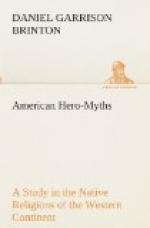[Footnote 1: Relacion de Antiguedades deste Reyno del Piru, por Don Joan de Santacruz Pachacuti Yamqui, passim. Pachacuti relates the story of Tunapa as being distinctly the hero-myth of the Qquichuas. He was also the hero-god of the Aymaras, and about him, says Father Ludovico Bertonio, “they to this day relate many fables and follies.” Vocabulario de la Lengua Aymara, s.v. Another name he bore in Aymara was Ecaco, which in that language means, as a common noun, an ingenious, shifty man of many plans (Bertonio, Vocabulario, s.v.). “Thunnupa,” as Bertonio spells it, does not lend itself to any obvious etymology in Aymara, which is further evidence that the name was introduced from the Qquichua. This is by no means a singular example of the identity of religious thought and terms between these nations. In comparing the two tongues, M. Alcide D’Orbigny long since observed: “On retrouve meme a peu pres un vingtieme des mots qui ont evidemment la meme origine, surtout ceux qui expriment les idees religieuses.” L’Homme Americain, considere sous ses Rapports Physiologiques et Moraux, Tome i, p. 322 (Paris, 1839). This author endeavors to prove that the Qquichua religion was mainly borrowed from the Aymaras, and of the two he regards the latter as the senior in civilization. But so far as I have been able to study the mythology of the Aymaras, which is but very superficially, on account of the lack of sources, it does not seem to be entitled to this credit.]
He tells us that at a very remote period, shortly after the country of Peru had been populated, there came from Lake Titicaca to the tribes an elderly man with flowing beard and abundant white hair, supporting himself on a staff and dressed in wide-spreading robes. He went among the people, calling them his sons and daughters, relieving their infirmities and teaching them the precepts of wisdom.
Often, however, he met the fate of so many other wise teachers, and was rejected and scornfully entreated by those whom he was striving to instruct. Swift retribution sometimes fell upon such stiff-necked listeners. Thus he once entered the town of Yamquesupa, the principal place in the province of the South, and began teaching the inhabitants; but they heeded him not, and seized him, and with insult and blows drove him from the town, so that he had to sleep in the open fields. Thereupon he cursed their town, and straightway it sank into the earth with all its inhabitants, and the depression was filled with water, and all were drowned. To this day it is known as the lake of Yamquesupa, and all the people about there well know that what is now a sheet of water was once the site of a flourishing city.
At another time he visited Tiahuanaco, where may yet be seen the colossal ruins of some ancient city, and massive figures in stone of men and women. In his time this was a populous mart, its people rich and proud, given to revelry, to drunkenness and dances. Little they cared for the words of the preacher, and they treated him with disdain. Then he turned upon them his anger, and in an instant the dancers were changed into stone, just as they stood, and there they remain to this day, as any one can see, perpetual warnings not to scorn the words of the wise.




